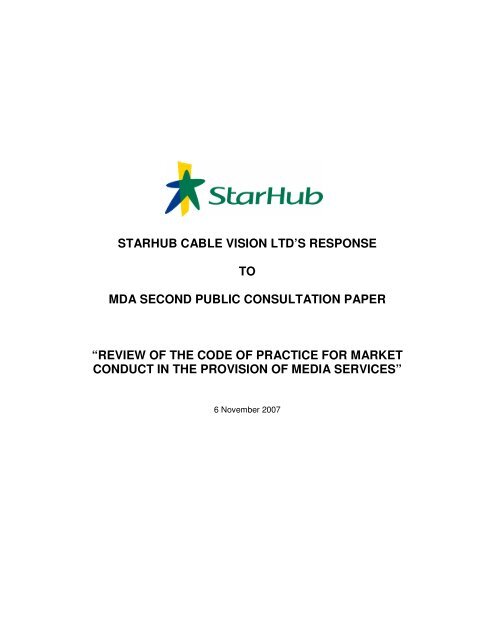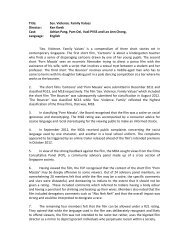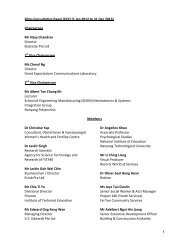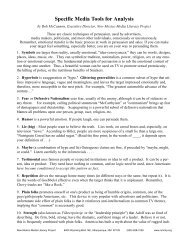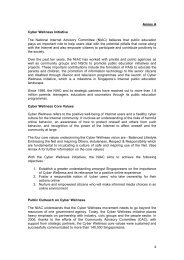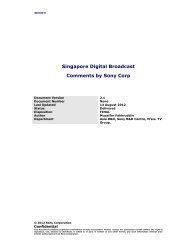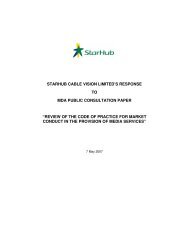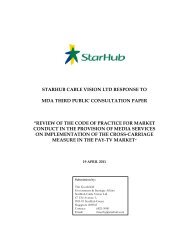starhub cable vision ltd's response to mda second public ...
starhub cable vision ltd's response to mda second public ...
starhub cable vision ltd's response to mda second public ...
You also want an ePaper? Increase the reach of your titles
YUMPU automatically turns print PDFs into web optimized ePapers that Google loves.
STARHUB CABLE VISION LTD’S RESPONSE<br />
TO<br />
MDA SECOND PUBLIC CONSULTATION PAPER<br />
“REVIEW OF THE CODE OF PRACTICE FOR MARKET<br />
CONDUCT IN THE PROVISION OF MEDIA SERVICES”<br />
6 November 2007
Introduction:<br />
StarHub Cable Vision Ltd (“StarHub”) welcomes the opportunity <strong>to</strong> comment on the<br />
Second Consultation Paper issued by MDA, in regard <strong>to</strong> the review of the Code of<br />
Practice for Market Conduct in the Pro<strong>vision</strong> of Media Services (“Code”).<br />
We believe that a clear, workable and effective Code is critical <strong>to</strong> the growth and<br />
development of Singapore’s media sec<strong>to</strong>r. We broadly support MDA’s move <strong>to</strong> adopt<br />
a “market-based” approach for assessing dominance and anti-competitive leveraging.<br />
Such assessment is both necessary (given the dynamic nature of the market), and is<br />
in line with international best practice. However, we do have some concerns with the<br />
manner in which MDA is looking <strong>to</strong> implement this methodology.<br />
StarHub has carefully reviewed the proposed Code, and has taken in<strong>to</strong> account: (i)<br />
StarHub’s experience in operating with the existing Code since 2002; and (ii)<br />
international best practice for competition codes in the broadcasting sec<strong>to</strong>r. StarHub’s<br />
comments are set out in the attached annexes, and are structured in<strong>to</strong>:<br />
(a) Section A, which focuses on:<br />
Dominance (Clause 5);<br />
Consolidation (Clause 8); and<br />
Prohibition on Anti-Competitive Leveraging (Clause 4.6)<br />
(b) Section B, which examines the other clauses of the proposed Code.<br />
StarHub’s Comments on MDA’s Media Market Conduct Code Review (November 2007) Page 2 of 28
SECTION A<br />
STARHUB’S COMMENTS TO KEY CLAUSES OF THE PROPOSED CODE<br />
In considering the proposed Code, StarHub has given particular consideration <strong>to</strong><br />
Clause 5 (Dominance); Clause 8 (Consolidation); and Clause 4.6 (Anti-competitive<br />
Leveraging).<br />
StarHub has studied carefully the proposed Code against the Broadcasting Ordinance<br />
and the Telecommunication Ordinance in Hong Kong, which we believe provide an<br />
example of international best practice for competition codes. We consider that Hong<br />
Kong provides a good comparison point, given its liberalised broadcasting market and<br />
the competitiveness of its info-communications sec<strong>to</strong>r.<br />
We note that the general approach taken by the Hong Kong Broadcasting Authority<br />
(“HKBA”) and the Hong Kong Telecommunications Authority (“Ofta”) differs from that<br />
set out in the proposed Code. Whereas the proposed Code appears <strong>to</strong> review the<br />
pro<strong>vision</strong>s in relation <strong>to</strong> dominance, anti-competitive leveraging and consolidation in<br />
isolation (and in some circumstances without providing detailed guidance as <strong>to</strong> the<br />
fac<strong>to</strong>rs MDA will consider in reaching its conclusions), the approach in Hong Kong <strong>to</strong><br />
competition analysis is a three-stage process:<br />
a) First, <strong>to</strong> define the relevant market;<br />
b) Second, <strong>to</strong> assess the competition in that market <strong>to</strong> determine the market<br />
power/dominance of the relevant licensee; and<br />
c) Third, <strong>to</strong> assess whether the conduct under review has an anti-competitive<br />
purpose or effect.<br />
The Hong Kong Broadcasting Ordinance Guidelines state that these stages cannot be<br />
reviewed and determined separately – there must be an integrated approach, as there<br />
is often an overlap of information relevant <strong>to</strong> each of the three stages. Thus, while the<br />
proposed Code reviews each of the key issues separately, the approach adopted in<br />
Hong Kong amounts <strong>to</strong> a comprehensive analysis of all the competition issues<br />
<strong>to</strong>gether, rather than focusing on one component. The Hong Kong approach ensures<br />
that a detailed competition analysis is conducted (which properly identifies the relevant<br />
market, the market power of the relevant licensee, and the impact of that licensee's<br />
conduct), before determining whether any of the relevant pro<strong>vision</strong>s of the<br />
Broadcasting Ordinance have been breached. The Hong Kong Broadcasting<br />
Ordinance Guidelines note that this approach is both based on international best<br />
practice and is consistent with the conceptual approach adopted by other competition<br />
authorities and regula<strong>to</strong>rs.<br />
The approach set out in the proposed Code, on the other hand, may result in a<br />
conclusion made without the benefit of a comprehensive, 'fully-informed' market<br />
analysis approach. Depending on the circumstances, this may adversely impact the<br />
industry and the opera<strong>to</strong>rs.<br />
StarHub believes that the proposed Code would be substantially strengthened if an<br />
integrated, three-stage, analytical approach (similar <strong>to</strong> that followed in Hong Kong)<br />
was adopted.<br />
StarHub’s specific comments on these clauses are set out below.<br />
StarHub’s Comments on MDA’s Media Market Conduct Code Review (November 2007) Page 3 of 28
Clause 5.3: Dominant Position<br />
Clause 5: Concept of Dominance<br />
Clause 5.3 of the proposed Code states that: “A Regulated Person is in a dominant<br />
position when it has Significant Market Power in any relevant media market…” When<br />
determining whether the Regulated Person has Significant Market Power, Clause<br />
5.3(a) of the proposed Code sets out the fac<strong>to</strong>rs <strong>to</strong> be taken in<strong>to</strong> account. The<br />
proposed Code then provides a rebuttable presumption in Clause 5.3(b) that a<br />
Regulated Person has “Significant Market Power” if that person has a market share<br />
greater than 60% in the relevant media market.<br />
A comparison with the Hong Kong Broadcasting Ordinance Guidelines reveals that a<br />
licensee is considered <strong>to</strong> be dominant where the licensee has the potential ability <strong>to</strong><br />
behave in an anti-competitive manner in the relevant market. To determine this, the<br />
HKBA will assess the degree of market power held by licensees within the relevant<br />
market. The Guidelines further stress that 'no single piece of evidence can provide a<br />
reliable indica<strong>to</strong>r of the degree of competition in a market….it will be necessary <strong>to</strong> look<br />
at a range of fac<strong>to</strong>rs in order <strong>to</strong> build up a picture of the operation of competition in that<br />
market'.<br />
The principal fac<strong>to</strong>rs that the HKBA considers when reaching this determination are:<br />
a) the behaviour of existing competi<strong>to</strong>rs, which includes a review of the market<br />
share of competi<strong>to</strong>rs in that market and the degree of competition between<br />
them;<br />
b) the scope of potential competition in that market, which primarily revolves<br />
around barriers <strong>to</strong> entry; and<br />
c) the extent of countervailing buying power and the presence of supplier buying<br />
power.<br />
In respect of the market share fac<strong>to</strong>r, the Hong Kong Broadcasting Ordinance<br />
Guidelines provide that there is a presumption of dominance if a licensee has a market<br />
share persistently above 50%. If, as a result of this analysis, the HKBA determines<br />
that the constraints on a licensee's conduct are not particularly effective, that licensee<br />
will be held <strong>to</strong> be dominant in the relevant market.<br />
On the other hand, the approach in the proposed Code prioritises the consideration of<br />
market share when determining whether a Regulated Party has Significant Market<br />
Power. This is evidenced by the rebuttable presumption and the other fac<strong>to</strong>rs in<br />
Clause 5.3(a). The Hong Kong approach, while acknowledging the importance of<br />
market share when considering whether a party is dominant, emphasises that market<br />
share is just a 'helpful piece of evidence', providing an 'initial guide' as <strong>to</strong> whether the<br />
licensee in question has market power. The Hong Kong Broadcasting Ordinance<br />
Guidelines also stress that a licensee with a relatively high market share may not hold<br />
market power.<br />
StarHub’s Comments on MDA’s Media Market Conduct Code Review (November 2007) Page 4 of 28
In addition, the presumption of dominance within the Hong Kong Broadcasting<br />
Ordinance is based on a market share persistently above 50%. The Hong Kong<br />
Broadcasting Ordinance provides an example of 12 months as the period of time<br />
which amounts <strong>to</strong> “persistently”. The Hong Kong Broadcasting Ordinance also states<br />
that if a licensee in a tele<strong>vision</strong> programme service market has a market share below<br />
40%, that licensee is unlikely <strong>to</strong> be dominant.<br />
However, the proposed Code lacks such qualifying statements in relation <strong>to</strong> market<br />
share, which could adversely impact its determination of whether a Regulated Person<br />
is dominant. While acknowledging the importance of market share, the Hong Kong<br />
Broadcasting Ordinance Guidelines emphasise that market share should not be <strong>to</strong> the<br />
exclusion of other considerations when determining whether a person has dominance<br />
in a market.<br />
StarHub believes that the proposed Code would benefit from following the Hong Kong<br />
approach, of specifying that market share is simply one piece of evidence <strong>to</strong> be<br />
considered in any assessment of dominance, and that a full range of fac<strong>to</strong>rs needs <strong>to</strong><br />
be taken in<strong>to</strong> account in any assessment of dominance or Significant Market Power.<br />
We believe that including this statement in the proposed Code would provide for more<br />
robust and reliable assessments of dominance or Significant Market Power.<br />
In addition, from a drafting perspective, Clause 5.3 of the proposed Code provides<br />
that, in determining whether a party has Significant Market Power, regard will be given<br />
<strong>to</strong> the fac<strong>to</strong>rs set out in Clause 5.3(a)(i) <strong>to</strong> 5.3(a)(vii). However, Clause 5.3(a)(vii)<br />
states that one of those fac<strong>to</strong>rs is 'the extent <strong>to</strong> which the Regulated Person's ability <strong>to</strong><br />
exercise Significant Market Power in the relevant media market is constrained by…..'.<br />
We would highlight that this definition is circular (Significant Market Power is assessed<br />
pursuant <strong>to</strong> Clause 5.3(a)(vii), and Clause 5.3(a)(vii) is dependent on Significant<br />
Market Power); and would propose that these pro<strong>vision</strong>s be redrafted <strong>to</strong> avoid any<br />
ambiguity as <strong>to</strong> the intention of the clause.<br />
Definition of Relevant “Media Market”<br />
StarHub notes that the term “media market(s)” is used extensively throughout the<br />
proposed Code. In particular, Clause 5.3(a) of the proposed Code specifies that one<br />
of the fac<strong>to</strong>rs <strong>to</strong> be considered in determining whether a Regulated Person has<br />
Significant Market Power is the 'proper definition of the relevant media market which<br />
includes all reasonable substitutes'. However, the proposed Code fails <strong>to</strong> define what<br />
constitutes a relevant “media market”, and fails <strong>to</strong> specify what fac<strong>to</strong>rs will be taken<br />
in<strong>to</strong> consideration when determining the relevant media market.<br />
This silence will lead <strong>to</strong> uncertainty in the market as <strong>to</strong> the application of the proposed<br />
Code.<br />
By way of comparison, the Hong Kong Broadcasting Ordinance Guidelines go in<strong>to</strong><br />
considerable detail as <strong>to</strong> how media markets should be defined. As a starting position,<br />
the Guidelines state that the HKBA considers that a 'tele<strong>vision</strong> programme service<br />
market' refers <strong>to</strong> a downstream market or markets for the pro<strong>vision</strong> of tele<strong>vision</strong><br />
programme service <strong>to</strong> the general <strong>public</strong> or a smaller segment of the <strong>public</strong>. This is<br />
based on the definition of 'tele<strong>vision</strong> programme service'; the services that are<br />
governed by the Hong Kong Broadcasting Ordinance; and the scope of the anticompetition<br />
pro<strong>vision</strong>s of that Ordinance. The HKBA has held that the Hong Kong<br />
Broadcasting Ordinance does not attempt <strong>to</strong> regulate any upstream market – it is only<br />
concerned with downstream markets, such as the domestic pay tele<strong>vision</strong> services<br />
StarHub’s Comments on MDA’s Media Market Conduct Code Review (November 2007) Page 5 of 28
market, or the domestic free tele<strong>vision</strong> services market, or a combination of both being<br />
a separate market.<br />
The Hong Kong Broadcasting Ordinance Guidelines take a traditional method of<br />
defining a market. Firms that constrain each other through the supply of close<br />
substitutes are said <strong>to</strong> compete in the same market. The process of defining a market<br />
requires the identification of close substitutes, both from the demand-side and the<br />
supply-side.<br />
In assessing the scope for demand-side substitution, the HKBA will take in<strong>to</strong> account<br />
the following fac<strong>to</strong>rs:<br />
a) evidence as <strong>to</strong> how cus<strong>to</strong>mers reacted <strong>to</strong> previous changes in relative prices;<br />
b) the extent <strong>to</strong> which consumers incur costs in switching between services; or<br />
c) evidence that suppliers base business decisions on the prospects of consumer<br />
substitution between products in <strong>response</strong> <strong>to</strong> relative price changes.<br />
When determining whether there are any supply-side substitutes, the HKBA will have<br />
regard <strong>to</strong>:<br />
a) the technology available and other requirements required <strong>to</strong> offer a product or<br />
service of comparable function in<strong>to</strong> the market under review;<br />
b) any spare capacity within the industry;<br />
c) information on the willingness of consumers <strong>to</strong> switch <strong>to</strong> new suppliers<br />
following a small but significant and non-transi<strong>to</strong>ry increase in price, possibly<br />
via market research; and<br />
d) information on past supply-side substitution and that in similar markets in other<br />
countries.<br />
As noted in StarHub’s first submission <strong>to</strong> MDA, if end-consumers regard other goods<br />
or services as reasonably good substitutes for the StarHub’s offerings, then such<br />
substitutes have <strong>to</strong> be included in the same media market, and the proposed Code<br />
should take this in<strong>to</strong> consideration.<br />
As a subscription tele<strong>vision</strong> licensee, StarHub faces vigorous and effective competition<br />
from a variety of sources, including Free-<strong>to</strong>-Air TV, IPTV, VOD, home video sales and<br />
rentals, and wireless <strong>cable</strong> service opera<strong>to</strong>rs.<br />
The lack of a clear definition in the proposed Code as <strong>to</strong> what will be considered the<br />
relevant “media market” will result in confusion. It could potentially lead <strong>to</strong> inconsistent<br />
interpretations by the Authority and the Regulated Persons, thereby giving rise <strong>to</strong><br />
conflicts among all affected parties.<br />
StarHub strongly believes that Clause 5.3(a) of the proposed Code should be modified<br />
<strong>to</strong> look beyond a single media market, when assessing dominance. Instead, we<br />
submit that MDA should assess dominance, taking in<strong>to</strong> account such fac<strong>to</strong>rs as the<br />
supply, cost and perceived attractiveness of substitute goods or services (as is done in<br />
Hong Kong).<br />
StarHub’s Comments on MDA’s Media Market Conduct Code Review (November 2007) Page 6 of 28
We would also highlight that Section 8.3 of IDA’s “Code of Practice for Competition in<br />
the Pro<strong>vision</strong> of Telecommunication Services 2005” (“Telecoms Code”) has helpfully<br />
acknowledged that, when considering dominance and competition issues, it is<br />
necessary <strong>to</strong> assess beyond the telecom market, rather than segregating the market<br />
artificially based on type of service offered. It is unclear why the Telecoms Code and<br />
the proposed Code should take different approaches in defining markets, and StarHub<br />
would respectfully submit that it is important for the two Codes <strong>to</strong> be aligned on this<br />
point.<br />
In reviewing the proposed Code, we strongly believe that MDA should clarify and<br />
specify the fac<strong>to</strong>rs it will adopt <strong>to</strong> determine the relevant “media market”, <strong>to</strong> enable an<br />
accurate interpretation of the Code.<br />
Transitional Pro<strong>vision</strong>s<br />
StarHub is disappointed <strong>to</strong> note that, under Clause 11.5.1 of the proposed Code, the<br />
“Media Development Authority of Singapore (Regulated Persons) (Dominant and Non-<br />
Dominant Positions) Notification 2003” would continue <strong>to</strong> apply.<br />
The objective of the proposed Code is <strong>to</strong> implement a robust and market-based<br />
assessment methodology for determining dominance and Significant Market Power. It<br />
is therefore unclear why the proposed Code has not followed this approach for major<br />
areas of the media sec<strong>to</strong>r. It is clear that the media market is evolving very rapidly in<br />
Singapore, and that dominance assessments carried out over four years ago may well<br />
be irrelevant in a number of scenarios.<br />
StarHub strongly believes that if Regulated Persons are <strong>to</strong> be considered <strong>to</strong> have<br />
“Significant Market Power” under the proposed Code, the analysis leading <strong>to</strong> that<br />
decision should be based on Clause 5 of the proposed Code, rather than under a<br />
Notification made in 2003.<br />
Reliance on a dominance assessment made over four years in the past could lead <strong>to</strong><br />
mistaken regula<strong>to</strong>ry decisions and <strong>to</strong> dis<strong>to</strong>rtions <strong>to</strong> the Singapore market. StarHub<br />
therefore respectfully submits that Clause 11.5.1 of the proposed Code should be<br />
deleted, and that any assessments of dominance and Significant Market Power must<br />
be considered pursuant <strong>to</strong> Clause 5 of the proposed Code.<br />
StarHub’s Comments on MDA’s Media Market Conduct Code Review (November 2007) Page 7 of 28
Clause 8 – Consolidation<br />
The consolidation pro<strong>vision</strong>s in the proposed Code can be broadly separated in<strong>to</strong> the<br />
following elements:<br />
a) administrative procedures, dealing with the application <strong>to</strong> MDA in respect of a<br />
consolidation, and the information <strong>to</strong> be provided with such an application;<br />
b) the analytical framework – that is, the impact on competition of the<br />
consolidation; and<br />
c) the conditions that can be imposed by MDA when granting approval <strong>to</strong> a<br />
consolidation.<br />
StarHub would offer its comments on these three stages.<br />
Administrative Procedures<br />
Under Clause 8.4 of the proposed Code, Regulated Persons entering in<strong>to</strong> a<br />
Consolidation must obtain MDA’s prior written approval (i.e. on an ex ante basis).<br />
This pro<strong>vision</strong> differs from both the Telecoms Code and the Hong Kong<br />
Telecommunications Ordinance Guidelines, which permit consolidations <strong>to</strong> be<br />
considered on both an ex ante and ex post basis, with the expectation that the most<br />
common analysis conducted will be ex post (i.e. after the event).<br />
The approach taken in Hong Kong, and by the IDA, reflects a realistic understanding<br />
that consolidations are often highly confidential with potentially substantial impacts on<br />
the valuations of the companies involved. By adopting an ex ante regime only, MDA<br />
may be artificially restricting corporate merger and acquisition activities in Singapore,<br />
as parties may become reluctant <strong>to</strong> consider a merger or acquisition if they must first<br />
obtain MDA approval prior <strong>to</strong> completing that transaction. This issue is exacerbated by<br />
the relative lack of detail in the proposed Code as <strong>to</strong> how the consolidation pro<strong>vision</strong>s<br />
will be implemented (for example, the fac<strong>to</strong>rs that must be considered when identifying<br />
the relevant market).<br />
StarHub suggests that, provided that there are sufficient remedies available <strong>to</strong> MDA<br />
and sufficient flexibility in the conditions that MDA can impose, the competitive<br />
analysis of consolidations should be conducted ex post as well as ex ante. Such a<br />
move would align the proposed Code with the Telecoms Code, and would provide a<br />
degree of commercial flexibility <strong>to</strong> parties considering a consolidation.<br />
In addition, it is important <strong>to</strong> note that the Hong Kong Telecommunications Ordinance<br />
Guidelines set out the specific type of information that Ofta will require when<br />
conducting its analysis of the effect of a consolidation. Similarly, the procedures that<br />
IDA will follow in considering consolidations in the Singapore telecommunications<br />
market have been detailed in IDA’s “Advisory Guidelines Governing Consolidation<br />
Review Process under Section 10 of the Code of Practice for Competition in the<br />
Pro<strong>vision</strong> of Telecommunication Services 2005”. In comparison, the proposed Code<br />
only provides a general description of the information that should be submitted.<br />
StarHub’s Comments on MDA’s Media Market Conduct Code Review (November 2007) Page 8 of 28
StarHub would therefore submit that it would be helpful for all parties if the proposed<br />
Code could set out the detailed procedures MDA intends <strong>to</strong> follow in considering<br />
Consolidations, as well as the information that parties will have <strong>to</strong> set out in<br />
consolidation requests. This would help <strong>to</strong> ensure that the competition analysis can be<br />
conducted in a comprehensive and timely manner.<br />
Analytical Framework<br />
Application of pro<strong>vision</strong>s<br />
The relevant consolidation pro<strong>vision</strong>s in Clause 8 of the proposed Code apply <strong>to</strong> any<br />
consolidation between a Regulated Person and:<br />
a) another Regulated Person; or<br />
b) an Ancillary Media Service Provider.<br />
The merger and acquisition pro<strong>vision</strong>s of the Telecommunications Ordinance in Hong<br />
Kong only apply where there has been a 'change in relation <strong>to</strong> a carrier licensee'.<br />
Thus, the application of the merger and acquisition pro<strong>vision</strong>s of the<br />
Telecommunications Ordinance in Hong Kong is much narrower than that of the<br />
proposed Code – it will only apply where the entity that is being acquired or is being<br />
merged with is a carrier licensee.<br />
In contrast, the proposed Code’s requirements extend beyond the Regulated Person<br />
<strong>to</strong> include all “Ancillary Media Service Providers”; who will not be MDA’s licensees,<br />
thereby resulting in an inefficient “over-reaching” of the Code.<br />
As there is no definition or clarification as <strong>to</strong> what a media service comprises, the<br />
extension of the consolidation pro<strong>vision</strong>s <strong>to</strong> cover Ancillary Media Service Providers<br />
creates significant ambiguity. For example, if StarHub intends <strong>to</strong> enter in<strong>to</strong> a<br />
consolidation with a power-line supplier, would it need <strong>to</strong> seek MDA’s prior approval?<br />
This is on the basis that a power-line is capable of transmitting broadcast signals, it<br />
may thus be considered as an “Ancillary Media Service Provider”, even though this<br />
consolidation may have no bearing on StarHub’s broadcasting service.<br />
Given that Part X of the Broadcasting Act has already adequately covered all aspects<br />
pertaining <strong>to</strong> the ownership and control of a broadcasting company, we strongly<br />
believe that Clause 8 of the proposed Code should be confined <strong>to</strong> any consolidation<br />
involving a Regulated Person with another of MDA’s media licensees. StarHub submit<br />
that the reference <strong>to</strong> “Ancillary Media Service Provider” should be removed from the<br />
proposed Code.<br />
In addition, Clause 8.4.1(c) of the proposed Code would capture the purchase of a<br />
Regulated Person’s assets by another person as a “Consolidation”. This would mean<br />
that any purchase of non-media related assets, regardless of the scale of the<br />
transaction, would be caught. Any person who purchases any assets from a<br />
Regulated Person, even if the purchase was of small scale or involved non-media<br />
assets, would require MDA’s prior written approval. This obligation differs<br />
considerably from the requirements of Section 10.4.1(b) of the Telecoms Code, which<br />
only requires IDA approval where the acquiring party “acquires all or substantially all of<br />
the assets of the Licensee”.<br />
StarHub’s Comments on MDA’s Media Market Conduct Code Review (November 2007) Page 9 of 28
In order <strong>to</strong> align the proposed Code with the Telecoms Code, and <strong>to</strong> ensure the<br />
proposed Code has an appropriate materiality threshold, StarHub submits that Clause<br />
8.4.1(c) should be amended <strong>to</strong> refer <strong>to</strong>:<br />
“The acquisition of all or substantially all of the media assets of the Regulated<br />
Person …”<br />
'Safe harbour' analysis<br />
In Hong Kong, the Telecommunications Ordinance Guidelines provide a 'safe harbour'<br />
analysis where there has been a merger or an acquisition (that is, where two persons<br />
cease <strong>to</strong> be distinct entities). This amounts <strong>to</strong> an acknowledgement by Ofta that not<br />
all consolidations will necessarily result in a lessening of competition in that market,<br />
particularly where there is sufficient competitive behaviour in that market from those<br />
competi<strong>to</strong>rs remaining in that market. In addition, the Hong Kong Telecommunications<br />
Ordinance will screen all consolidations <strong>to</strong> determine whether any further detailed<br />
analysis is required by using the four-firm concentration ratio (“CR4”) and the<br />
Herfindahl Hirschmann Index (“HHI”).<br />
Under the CR4 test, Ofta is unlikely <strong>to</strong> intervene, if:<br />
a) the post-merger combined market share of the four (or fewer) largest firms<br />
(CR4) in the relevant market is less than 75%, and the merged firm has a<br />
market share of less than 40%; or<br />
b) if the CR4 is 75% or more, and the merged firm’s market share is less than<br />
15%.<br />
In any event, if the post-merger combined market share of the parties <strong>to</strong> the<br />
transaction is 40 per cent or more, it is likely that Ofta will investigate the competition<br />
effect of the transaction.<br />
Under the HHI test, Ofta is unlikely <strong>to</strong> intervene if:<br />
a) the post-merger HHI of the relevant market is less than 1,000, as this indicates<br />
that the market is not concentrated;<br />
b) the post-merger HHI of the relevant market is between 1,000 and 1,800 and<br />
the proposed transaction would only raise the HHI by less than 100; and<br />
c) the post-merger HHI of the relevant market is more than 1,800 and the<br />
proposed transaction would only raise the HHI by less than 50.<br />
While the proposed Code uses a variation of the CR4 test adopted in Hong Kong,<br />
StarHub believes that the addition of the HHI analysis would provide additional useful<br />
guidance <strong>to</strong> Regulated Persons prior <strong>to</strong> any consolidation being contemplated.<br />
StarHub’s Comments on MDA’s Media Market Conduct Code Review (November 2007) Page 10 of 28
Clause 4.6 – Prohibition on Anti-competitive Leveraging<br />
Clause 4.6 of the proposed Code deals with the prohibition on anti-competitive<br />
leveraging. This prohibition falls under the general discussion in the proposed Code<br />
on prohibitions of unfair methods of competition, and extends <strong>to</strong> any media market.<br />
The Hong Kong Broadcasting Ordinance Guidelines consider this concept in their<br />
discussion on the abuse of a dominant position. The Hong Kong Broadcasting<br />
Ordinance Guidelines refer <strong>to</strong> this situation as a cross-subsidy, where a licensee<br />
leverages its dominance in one market in<strong>to</strong> a market where it is non-dominant.<br />
However, consistent with the Hong Kong Broadcasting Ordinance itself, the Guidelines<br />
are only concerned where such activity has the purpose or effect of unreasonably<br />
preventing, dis<strong>to</strong>rting or substantially restricting competition in a tele<strong>vision</strong> programme<br />
service market (and not the broader media market).<br />
The Hong Kong Broadcasting Ordinance Guidelines also specifically note that the<br />
receipt of a cross-subsidy is not (of itself) an infringement of the anti-competition<br />
pro<strong>vision</strong>s. In fact, the Broadcasting Ordinance Guidelines acknowledge that crosssubsidies<br />
can be pro-competitive in certain circumstances.<br />
The Hong Kong Broadcasting Ordinance Guidelines detail the circumstances in which<br />
financial transfers may amount <strong>to</strong> a breach of the prohibition of cross-subsidies. The<br />
Guidelines specifically refer <strong>to</strong> situations where the licensee's revenues from an<br />
activity in a market in which it is not dominant fail <strong>to</strong> cover the costs associated with<br />
that activity over the economic lifetime of the relevant product or service. The<br />
Guidelines specify that reference must be made <strong>to</strong> future revenues as well as past<br />
losses.<br />
By way of comparison, Clause 4.6(b) of the proposed Code merely acknowledges that<br />
MDA will assess each incidence of potential anti-competitive leveraging on a case-bycase<br />
basis.<br />
The proposed Code does not set out the assessment criteria MDA intends <strong>to</strong> follow,<br />
and the circumstances in which MDA would or would not consider being in breach of<br />
the proposed Code.<br />
To reduce possible ambiguity as <strong>to</strong> what leveraging activities would amount <strong>to</strong> a<br />
breach of the proposed Code, StarHub would strongly submit that the proposed Code<br />
should establish a set of practical and workable guidelines which would clearly set out<br />
the fac<strong>to</strong>rs MDA will consider in assessing anti-competitive leveraging behaviour.<br />
StarHub’s Comments on MDA’s Media Market Conduct Code Review (November 2007) Page 11 of 28
SECTION B<br />
STARHUB’S COMMENTS TO OTHER CLAUSES OF THE PROPOSED CODE<br />
Clause 1.1 - “This Code is intended <strong>to</strong>: (a) enable and maintain fair market conduct<br />
and effective competition in Singapore’s media industry”<br />
StarHub would note that the terms “Singapore’s media industry” and “media industry”<br />
are used extensively throughout the proposed Code (for example, in Clauses 1.6, 1.8,<br />
4.8, 7.1, 7.3, and 7.7). However, neither of these terms is defined. By way of<br />
comparison, the existing Code refers <strong>to</strong> “Mass Media Services Markets”, which is a<br />
defined term.<br />
The terms “Singapore’s media industry” and “media industry” are used <strong>to</strong> define the<br />
objectives of the proposed Code, and the considerations <strong>to</strong> be given in assessing anticompetitive<br />
agreements. We therefore strongly submit that it is necessary for the<br />
proposed Code <strong>to</strong> define “Singapore’s media industry” and “media industry”. For the<br />
sake of consistency with the existing Code, we would suggest that the definition of<br />
these terms be linked <strong>to</strong> the definition of “Regulated Persons”.<br />
Clause 1.5(b)(iii) - “Ancillary Media Service” means the pro<strong>vision</strong> of infrastructure,<br />
systems, services, information or other resources that are used or intended <strong>to</strong> be used<br />
in connection with the pro<strong>vision</strong> or delivery of any media service. Examples of such<br />
Ancillary Media Services include video programmes production and newspaper<br />
distribution.<br />
It is important for all Regulated Persons <strong>to</strong> have a clear understanding of the relevant<br />
clauses of the proposed Code, so as <strong>to</strong> encourage compliance and facilitate<br />
implementation of the Code. StarHub would therefore propose <strong>to</strong> remove ambiguous<br />
terms, and <strong>to</strong> revise the above clause <strong>to</strong>:<br />
“Ancillary Media Service” means the pro<strong>vision</strong> of infrastructure, systems, services,<br />
information or other resources that are used or intended <strong>to</strong> be used in connection with<br />
the pro<strong>vision</strong> or delivery of any media service. Examples of such Ancillary Media<br />
Services include video programmes production and newspaper distribution.<br />
If this amendment is not made, it is likely that there will be disagreement and ambiguity<br />
as <strong>to</strong> the potential “intended” uses of various systems, services, etc.<br />
Clause 1.5(b)(ix) - “Consolidation Application Fee” means the fee specified in<br />
paragraph 8.9 of this Code.<br />
Clause 8.9 - Each Consolidation Application must be accompanied by a certified<br />
cheque, directing payment <strong>to</strong> MDA, in the amount of S$10,000.<br />
All Regulated Persons are already subject <strong>to</strong> a licence fee payment <strong>to</strong> MDA, and<br />
StarHub understands that the objective of this licence fee is for MDA <strong>to</strong> recover its<br />
costs in administering the licences and performing its various regula<strong>to</strong>ry functions.<br />
StarHub would note that:<br />
StarHub’s Comments on MDA’s Media Market Conduct Code Review (November 2007) Page 12 of 28
The licence fee MDA levies on broadcasters is up <strong>to</strong> 2.5% of a broadcaster’s<br />
<strong>to</strong>tal income (as compared <strong>to</strong> IDA’s FBO licence fee of 1% of an opera<strong>to</strong>r’s<br />
Annual Gross Turnover);<br />
Reviewing the consolidation applications of its licensees must be considered<br />
one of MDA’s core regula<strong>to</strong>ry function; and<br />
Other regula<strong>to</strong>ry agencies, such as IDA, do not levy such fees.<br />
StarHub would therefore submit that Clause 8.9 of the proposed Code should be<br />
deleted.<br />
Clause 1.5(xi) - “Consumer” means an end-consumer, and/or person that buys goods<br />
and/or services as inputs for production or for resale, as the context demands.<br />
While StarHub notes that the definition of a “Consumer” has been modified since the<br />
first consultation, StarHub submits that this definition is still fundamentally flawed.<br />
First, this definition fails <strong>to</strong> recognise that Regulated Persons will provide a range of<br />
services, not all of which will be media services. For example, StarHub Cable Vision<br />
provides telecommunications services (such as wholesale broadband access), under<br />
the regula<strong>to</strong>ry oversight of IDA. However, under the proposed definition, any cus<strong>to</strong>mer<br />
of the Regulated Person will become a “Consumer” pursuant <strong>to</strong> the Media Code, even<br />
if that person is not purchasing media services.<br />
Second, the definition of “Consumer” under the proposed Code differs from that<br />
defined in MDA’s (Standards of Performance) (Termination of Contracts) (“SOPTOC”).<br />
Under SOPTOC, “Consumer” is defined as “any person who is party <strong>to</strong> a contract with<br />
a Licensed Entity for the reception of any broadcasting service provided by the<br />
Licensed Entity, or for the pro<strong>vision</strong>, installation or maintenance by the Licensed Entity<br />
of any apparatus, plant or facility <strong>to</strong> be used by that person for the reception of any<br />
other broadcasting service (including any FTA broadcasting service).” We believe that<br />
the SOPTOC definition of “Consumer” is more workable than the definition of<br />
“Consumer” under the proposed Code.<br />
Third, the definition of “Consumer” is still both broad and ambiguous. It is unclear<br />
under what “context” the definition would define Consumer as an end-consumer, and<br />
when it would define a Consumer as a reseller. This lack of certainty will create<br />
disputes between parties unless it is clarified.<br />
For the sake of consistency and clarity, StarHub submits that the definition of<br />
“Consumer” should refer <strong>to</strong> “end-users”, where end-users are defined as “a business<br />
or residential user of any media services in Singapore”.<br />
Clause 1.5(b)(xvii) – “Essential Resources” means any apparatus, accessory, system,<br />
service, information or such other resource of any kind, used or intended <strong>to</strong> be used in<br />
connection with the pro<strong>vision</strong> or delivery of any media service provided by a Media<br />
Licensee, and which satisfies the criteria set out in paragraph 9.3.1.5 or 9.3.1.6 of this<br />
Code and is specified by MDA as an Essential Resource pursuant <strong>to</strong> section 18(2) of<br />
the MDA Act.<br />
StarHub’s Comments on MDA’s Media Market Conduct Code Review (November 2007) Page 13 of 28
StarHub is concerned that, under the proposed Code, MDA can determine the scope<br />
of what constitutes, or is “intended <strong>to</strong> be”, an Essential Resource. As commercial<br />
entities, it is important for Regulated Persons <strong>to</strong> retain the primary right <strong>to</strong> control and<br />
manage their infrastructure, and <strong>to</strong> allocate their capital resources. It is also important<br />
that the Regulated Persons have a certainty level over the control of their resources.<br />
As highlighted previously, the lack of definition of what the term “media service” would<br />
encompass would aggravate the vagueness and uncertainty <strong>to</strong> all Regulated Persons.<br />
Such a broad and vague obligation, in which MDA can designate any service or<br />
network as an “Essential Resource”, would create considerable uncertainty in the<br />
industry, and reduce the incentive for the Regulated Persons <strong>to</strong> upgrade or enhance<br />
their relevant network infrastructure.<br />
StarHub therefore respectfully suggests that “intended <strong>to</strong> be used” should be deleted,<br />
and that greater detail be provided as <strong>to</strong> the definition of “Essential Resources” and<br />
the process <strong>to</strong> be used for determining such resources.<br />
Clause 1.5(b)(xxxi) – “subscription fee” means any form of consideration.<br />
StarHub believes that the wording “any form of consideration” is unnecessarily vague,<br />
and could generate confusion. For example, in exchange for receiving free tele<strong>vision</strong><br />
services, a cus<strong>to</strong>mer will be exposed <strong>to</strong> extensive advertising from the service<br />
provider. Given the ambiguous definition under the proposed Code, it is unclear<br />
whether this form of exchange would be considered as “subscription fee”.<br />
StarHub therefore submits that the definition of “subscription fee” should be confined<br />
<strong>to</strong> a recurring fee in exchange for the pro<strong>vision</strong> of a service, and should not include<br />
unrelated hardware cost or installation fee. This approach is consistent with Clause<br />
3.4.2 of the proposed Code which specifies that “A Regulated Person may only charge<br />
any Subscriber for the specific Subscription Service or associated equipment that the<br />
said Subscriber has ordered.”<br />
StarHub would therefore propose <strong>to</strong> amend the definition of “subscription fee” <strong>to</strong> “any<br />
form of recurring payment of fees and charges for receipt of a media service, excluding<br />
unrelated hardware costs and installation fees consideration.”<br />
Clause 1.5(b)(xxxii) – “Subscription Service” means a service provided by a<br />
Regulated Person <strong>to</strong> a Consumer upon the payment of a subscription fee<br />
As noted above, Regulated Persons will provide a range of services <strong>to</strong> cus<strong>to</strong>mers, and<br />
not all of those services will be media services. For example, StarHub Cable Vision<br />
provides telecommunications services (such as wholesale broadband access), under<br />
the regula<strong>to</strong>ry oversight of IDA. However, under the proposed definition, any service<br />
provided by a Regulated Person <strong>to</strong> a Consumer becomes a “Subscription Service”, if a<br />
subscription fee is paid, regardless of whether it is a media service or not.<br />
StarHub therefore strongly believes that it is necessary <strong>to</strong> amend this definition <strong>to</strong>:<br />
“Subscription Service” means a service provided by a Regulated Person, under<br />
a licence issued by the Authority, <strong>to</strong> a Consumer upon the payment of a<br />
subscription fee”<br />
StarHub’s Comments on MDA’s Media Market Conduct Code Review (November 2007) Page 14 of 28
Clause 1.5(b)(xxxiii) - “Subscription Tele<strong>vision</strong> Licensee” refers <strong>to</strong> any person<br />
licensed <strong>to</strong> provide subscription nationwide tele<strong>vision</strong> services, subscription localised<br />
tele<strong>vision</strong> services or video-on-demand services pursuant <strong>to</strong> the Broadcasting Act<br />
(Cap. 28).<br />
Following MDA’s recent formalisation of its Broadcasting IPTV Licensing Framework,<br />
we would submit that the term “localised” should be replaced with “niche”, <strong>to</strong> reflect the<br />
updated definitions in the licensing framework. This change should also be made <strong>to</strong><br />
Clause 1.5(b)(xx) and 1.5(v)(xxxiv).<br />
Clause 1.6.4(a) – MDA will endeavour <strong>to</strong> apply the pro<strong>vision</strong>s of this Code in a<br />
transparent manner. In general, MDA will<br />
(i) provide an opportunity <strong>to</strong> respond <strong>to</strong> persons who are the parties <strong>to</strong> any valid<br />
complaint or who are directly affected by any decision of MDA;<br />
It is likely that many MDA decisions will impact on a range of Regulated Persons,<br />
directly and indirectly. By restricting <strong>response</strong>s <strong>to</strong> persons who are “directly affected”,<br />
this clause may restrict feedback and prevent a comprehensive review of the issue.<br />
We would note that Section 59(1) of the Broadcasting Act states that “Any licensee<br />
aggrieved by (a) any decision of the Authority in the exercise of any discretion vested<br />
in it by or under this Act; or (b) anything contained in any Code of Practice or direction<br />
issued by the Authority, may appeal <strong>to</strong> the Minister.” There is no suggestion under<br />
Section 59(1) that only directly affected parties should have the right <strong>to</strong> be heard.<br />
For consistency purposes, and <strong>to</strong> ensure that all parties affected by a decision are<br />
able <strong>to</strong> provide their input, StarHub would submit that word “directly” should be deleted<br />
from this Clause.<br />
Clause 1.6.8(b) - However, the phenomenon of convergence is in its early stages, with<br />
different platforms subject <strong>to</strong> differing degrees of competition. Therefore, objective<br />
application of these principles may result initially in the imposition of different<br />
regula<strong>to</strong>ry obligations on Regulated Persons which utilize different platforms. In certain<br />
cases, <strong>public</strong> interest may require the imposition of special obligations on Regulated<br />
Persons who use different platforms.<br />
As the proposed Code is intended <strong>to</strong> regulate the behaviour of opera<strong>to</strong>rs and the<br />
services offered by the opera<strong>to</strong>rs in Singapore, it is only appropriate for the proposed<br />
Code <strong>to</strong> treat all opera<strong>to</strong>rs (and all service platforms) in a non-discrimina<strong>to</strong>ry manner.<br />
The imposition of discrimina<strong>to</strong>ry regula<strong>to</strong>ry obligations would create uncertainty and<br />
dis<strong>to</strong>rtions, and discourage investment in the sec<strong>to</strong>r. StarHub therefore strongly<br />
submits that Clause 1.6.8(b) should be deleted in its entirety.<br />
StarHub’s Comments on MDA’s Media Market Conduct Code Review (November 2007) Page 15 of 28
Clause 1.7.1 - At least once every 3 years, MDA will review this Code <strong>to</strong> ensure the<br />
effective attainment of MDA’s goals. As part of the triennial review process, MDA will<br />
provide an opportunity for industry and <strong>public</strong> comment. The duration of any <strong>public</strong><br />
consultation exercise will provide appropriate time for consideration of any change <strong>to</strong><br />
the Code and for consultees <strong>to</strong> construct a <strong>response</strong>.<br />
StarHub believes that the sentence in the original Code is more practical and<br />
appli<strong>cable</strong>, given the pace of change in the broadcasting market.<br />
StarHub would therefore propose <strong>to</strong> reinstate the sentences from the original Code:<br />
“At least once every 3 years, the MDA will review this Code. As part of the<br />
triennial review process, the MDA will provide an opportunity for industry and<br />
<strong>public</strong> comments. The MDA will eliminate or modify pro<strong>vision</strong>s that it<br />
determines are no longer necessary. For example, a pro<strong>vision</strong> may no longer<br />
be necessary where:<br />
(a) the growth of competition makes it possible <strong>to</strong> rely on market forces,<br />
rather than regulation;<br />
(b) changed policy concerns eliminate the need for regulation; or<br />
(c) experience demonstrates that the MDA can achieve its goals in a more<br />
efficient or effective manner.”<br />
Clause 2.6.2.2(c) – If no other Free-<strong>to</strong>-Air Tele<strong>vision</strong> Licensee agrees <strong>to</strong> acquire the<br />
rights on these terms within 3 weeks of the offer, the Free-<strong>to</strong>-Air Tele<strong>vision</strong> Licensee<br />
must offer <strong>to</strong> make the rights <strong>to</strong> broadcast the programme available, on similar terms<br />
specified above, <strong>to</strong> any Subscription Tele<strong>vision</strong> Licensee. The Free-<strong>to</strong>-Air Tele<strong>vision</strong><br />
Licensee, or any person negotiating on its behalf, must use its best efforts <strong>to</strong> limit the<br />
extent <strong>to</strong> which licences with any rights holder restrict the ability of the Free-<strong>to</strong>-Air<br />
Tele<strong>vision</strong> Licensee <strong>to</strong> comply with the requirements contained in paragraph 2.6.<br />
Given that there is only one Free-To-Air Tele<strong>vision</strong> Licensee in the market, we believe<br />
that this clause is inappropriate and should be deleted in its entirety. We do not<br />
believe there is any reason <strong>to</strong> give a-priori preference <strong>to</strong> Free-To-Air Tele<strong>vision</strong><br />
Licensees, given the number and reach of subscription tele<strong>vision</strong> licensees in the<br />
Singapore market.<br />
Clause 3 - Regulated Persons’ Duties <strong>to</strong> End-Consumer<br />
As Clause 3 deals with the Regulated Persons’ duties <strong>to</strong> their end-users, all references<br />
of “Subscribers” and “Consumers” in this clause need <strong>to</strong> be amended <strong>to</strong> refer <strong>to</strong> “enduser”<br />
for reasons of standardisation and consistency. The use of different terms will<br />
simply create ambiguity and uncertainty.<br />
Clause 4.4.2(b) - A Regulated Person must not take any action, or induce any other<br />
person <strong>to</strong> take any action, that has the effect of either:<br />
(b) has the effect of raising the other Media Licensee’s costs of providing such media<br />
service, without a legitimate business, operational or technical justification.<br />
StarHub’s Comments on MDA’s Media Market Conduct Code Review (November 2007) Page 16 of 28
There is a typographical error in this clause, as the statement “has the effect of” is<br />
repeated.<br />
In addition, given that MDA has already revised the Code <strong>to</strong> refer <strong>to</strong> “Regulated<br />
Person”, the reference <strong>to</strong> “Media Licensee” should be amended for reasons of<br />
consistency.<br />
StarHub would therefore propose <strong>to</strong> amend this clause <strong>to</strong> state:<br />
“A Regulated Person must not take any action, or induce any other person <strong>to</strong><br />
take any action, that has the effect of either:<br />
(b) has the effect of raising the other Media Licensee’s Regulated Person’s<br />
costs of providing such media service, without a legitimate business,<br />
operational or technical justification.”<br />
Clause 4.4.3 - Whilst Regulated Persons are not required <strong>to</strong> disclose proprietary or<br />
commercially sensitive information <strong>to</strong> their competi<strong>to</strong>rs, a Regulated Person must not<br />
provide false or misleading information if it will unreasonably restrict competition in any<br />
media market in Singapore.<br />
StarHub believes that the deliberate pro<strong>vision</strong> of misleading information should be<br />
prohibited. We would highlight that the proposed wording of clause 4.4.3 implies that<br />
a Regulated Person can provide false and misleading information, provided that it<br />
does not unreasonably restrict competition in the market. StarHub would therefore<br />
suggest amending Clause 4.4.3 as follow:<br />
“Whilst Regulated Persons are not required <strong>to</strong> disclose proprietary or<br />
commercially sensitive information <strong>to</strong> their competi<strong>to</strong>rs, a Regulated Person<br />
must not provide false or misleading information <strong>to</strong> another Regulated Person.<br />
if it will unreasonably restrict competition in any media market in Singapore.”<br />
Clause 5.3(vii)(D) – the extent <strong>to</strong> which the Regulated Person’s ability <strong>to</strong> exercise<br />
Significant Market Power in the relevant media market is constrained by:<br />
(D) the ability of Ancillary Media Service Providers <strong>to</strong> switch <strong>to</strong> alternative Consumers.<br />
The definition in the proposed Code of “Ancillary Media Service Providers” focuses on<br />
the pro<strong>vision</strong> of infrastructure, systems, services or other resources for the pro<strong>vision</strong> or<br />
delivery of media services. “Ancillary Media Service Providers” may have no<br />
relationship at all with “Consumers” (as defined under the proposed Code). It is likely<br />
that “Ancillary Media Service Providers” would deal with broadcasting opera<strong>to</strong>rs, rather<br />
than with end-users and resellers. StarHub would therefore submit that this clause<br />
should be reverted <strong>to</strong> its original wording:<br />
“Clause 5.3(vii)(D) – the extent <strong>to</strong> which the Regulated Person’s ability <strong>to</strong><br />
exercise Significant Market Power in the relevant media market is constrained<br />
by:<br />
(D) the ability of Ancillary Media Service Providers <strong>to</strong> switch <strong>to</strong> alternative<br />
clients Consumers.”<br />
StarHub’s Comments on MDA’s Media Market Conduct Code Review (November 2007) Page 17 of 28
Clause 5.6.1.2 – MDA will exempt a Dominant Person from specific obligations<br />
appli<strong>cable</strong> <strong>to</strong> Dominant Persons, in some or all media markets in which the Dominant<br />
Person participates, in any case in which the Dominant Person demonstrates that<br />
compliance with the obligation is not necessary <strong>to</strong> prevent it from carrying out<br />
unilateral anticompetitive conduct, such as unilaterally raising prices charged above<br />
competitive levels, reducing prices paid below competitive levels, reducing quality,<br />
imposing unreasonable contract terms, excluding competi<strong>to</strong>rs from the market, or<br />
otherwise acting independently of competitive market forces.<br />
As noted above, it is important for the proposed Code <strong>to</strong> clearly set out the obligations<br />
on parties subject <strong>to</strong> the Code. If this is not done, the proposed Code will simply<br />
create disputes and uncertainty. However, the proposed Clause 5.6.1.2 removes<br />
certainty from the proposed Code, as it obfuscates what will be considered anticompetitive<br />
conduct. StarHub therefore submits that this clause should revert <strong>to</strong> its<br />
original wording:<br />
“MDA will exempt a Dominant Person from specific obligations appli<strong>cable</strong> <strong>to</strong><br />
Dominant Persons, in some or all media markets in which the Dominant<br />
Person participates, in any case in which the Dominant Person demonstrates<br />
that compliance with the obligation is not necessary <strong>to</strong> prevent it from carrying<br />
out unilateral anticompetitive conduct, such as unilaterally raising prices<br />
charged above competitive levels, reducing prices paid below competitive<br />
levels, reducing quality, imposing unreasonable contract terms, excluding<br />
competi<strong>to</strong>rs from the market, or otherwise acting independently of competitive<br />
market forces.”<br />
Clause 6.1 – As they are not subject <strong>to</strong> competitive market forces, Dominant Persons<br />
will be subject <strong>to</strong> additional regula<strong>to</strong>ry obligations and prohibitions designed <strong>to</strong> prevent<br />
them from using their market position in a manner that will harm Consumers or<br />
unreasonably restrict competition in any media market in Singapore.<br />
Given the Code is subject <strong>to</strong> the Singapore’s jurisdiction, and is for regulating the local<br />
opera<strong>to</strong>r’s conduct in Singapore, we believe that the reference <strong>to</strong> “in Singapore” is<br />
redundant and should be deleted.<br />
Clause 6.3.1 – A Dominant Person must provide its media service, upon reasonable<br />
request, <strong>to</strong> any prospective Consumer.<br />
StarHub would highlight that there are instances when the Dominant Person may well<br />
be unable <strong>to</strong> provide its service, for reasons such as:<br />
(a) where the consumer provides the Regulated Person with incorrect, false, or<br />
misleading information;<br />
(b) where the consumer becomes (or threaten <strong>to</strong> become) bankrupt or insolvent, or<br />
prepares <strong>to</strong> go in<strong>to</strong> liquidation;<br />
(c) where the consumer has defaulted on payment <strong>to</strong> any Regulated Person or its<br />
affiliates;<br />
StarHub’s Comments on MDA’s Media Market Conduct Code Review (November 2007) Page 18 of 28
(d) where it is not practically possible for the Regulated Person <strong>to</strong> serve the consumer<br />
(for example, the infrastructure necessary for service pro<strong>vision</strong> is not available);<br />
(e) where the potential consumer is abusive or threatening <strong>to</strong> the staff of the<br />
Regulated Person;<br />
(f) where the pro<strong>vision</strong> of service will constitute a breach of a Court Order; a material<br />
breach of legislation, regulations or contract; and<br />
(g) where pro<strong>vision</strong> of the service will subject the Regulated Person <strong>to</strong> litigation risk.<br />
We therefore submit Clause 6.3.1 should be deleted, and that any request for service<br />
should be covered in the contractual terms between the Regulated Person and the<br />
Consumer.<br />
Clause 6.3.3(a)(ii) – A Dominant Person must provide any Media Licensee with the<br />
ability <strong>to</strong> purchase advertising capacity <strong>to</strong> promote its media service(s) on reasonable<br />
and non- discrimina<strong>to</strong>ry prices, terms and conditions. However, advertising capacity<br />
may be declined on reasonable grounds which include, but are not limited <strong>to</strong>, the<br />
following:<br />
(ii) in cases that credit checks carried out on the Consumer reveal a bad credit rating<br />
at the time of application.<br />
As this clause pertains <strong>to</strong> the purchase of advertising capacity by the Regulated<br />
Person, it should be amended <strong>to</strong> apply <strong>to</strong> “advertising client” instead of the<br />
“Consumer”, as defined under the proposed Code:<br />
“A Dominant Person must provide any Media Licensee Regulated Person with the<br />
ability <strong>to</strong> purchase advertising capacity <strong>to</strong> promote its media service(s) on reasonable<br />
and non- discrimina<strong>to</strong>ry prices, terms and conditions. However, advertising capacity<br />
may be declined on reasonable grounds which include, but are not limited <strong>to</strong>, the<br />
following:<br />
(ii) in cases that credit checks carried out on the client of an Advertiser reveal a bad<br />
credit rating at the time of application.”<br />
Clause 6.4.1 - A Dominant Person must not use its position in the media market in a<br />
manner that restricts competition in, or has the intended cause or actual effect of<br />
preventing, restricting or dis<strong>to</strong>rting competition in any media market or Ancillary Media<br />
Services market.<br />
StarHub believes that this Clause should prohibit anti-competitive behaviour that<br />
unreasonably and substantially restricts competition. As it is currently worded, if<br />
competition from a Dominant Person drives an inefficient opera<strong>to</strong>r out of the market,<br />
this could be interpreted as a breach of Clause 6.4.1. StarHub therefore proposes <strong>to</strong><br />
amend this Clause <strong>to</strong>:<br />
“A Dominant Person must not use its position in the media market in a manner<br />
that unreasonably and substantially restricts competition in, or has the intended<br />
cause or actual effect of preventing, restricting or dis<strong>to</strong>rting competition in any<br />
media market or Ancillary Media Services market.”<br />
StarHub’s Comments on MDA’s Media Market Conduct Code Review (November 2007) Page 19 of 28
This amendment will also align this Clause with the wording in the rest of the proposed<br />
Code.<br />
Clause 6.4.2.3 - A Dominant Person must not, expressly or effectively, require a<br />
Consumer who wants <strong>to</strong> purchase any media service, or an Advertiser who wants <strong>to</strong><br />
purchase advertising capacity, <strong>to</strong> additionally purchase or lease any other separate<br />
service, advertising capacity, or equipment, as a condition for purchasing the media<br />
service or advertising capacity, whether provided by the Dominant Person or another<br />
person. However, the Dominant Person may offer Consumers or Advertisers the<br />
option of purchasing such group selling/packaging services where the purchase of<br />
such a package is not manda<strong>to</strong>ry, and the separate services, advertising capacity or<br />
equipment comprised within the package can be purchased individually.<br />
One of the basic features of subscription tele<strong>vision</strong> services is that cus<strong>to</strong>mers must<br />
subscribe <strong>to</strong> a basic tier package before they are able <strong>to</strong> subscribe <strong>to</strong> any additional<br />
premium channel(s). This is a common practice across the region from opera<strong>to</strong>rs in<br />
Hong Kong, Malaysia, Australia, UK, and the US. Subscription tele<strong>vision</strong> opera<strong>to</strong>rs<br />
are also bound by upstream contractual arrangements with content providers <strong>to</strong><br />
bundle specific channels <strong>to</strong>gether as a package, as part of conditions for the carriage<br />
of the channels. In such cases, it will not be possible for the subscription tele<strong>vision</strong><br />
opera<strong>to</strong>r <strong>to</strong> unilaterally unbundle its basic package, without breaching its contractual<br />
arrangements.<br />
With reference <strong>to</strong> Hong Kong, we would highlight that the Broadcasting Ordinance<br />
Guidelines state that the HKBA does not consider bundling per se <strong>to</strong> be anticompetitive.<br />
Rather, the Guidelines contemplate that bundling is only anti-competitive<br />
where there is tying of supply of one service in a market which the supplier is not<br />
dominant <strong>to</strong> the supply of another service in a market which the supplier is dominant.<br />
The Hong Kong Broadcasting Ordinance does not consider bundling of different pay<br />
TV channels as being anti-competitive.<br />
StarHub would therefore submit that Clause 6.4.2.3 should be deleted.<br />
If MDA is not willing <strong>to</strong> delete this clause we believe that this Clause should at least be<br />
aligned with the equivalent clause in IDA’s Telecom’s Code (Section 4.2.1.3 of the<br />
Telecoms Code). Aligning the clauses would leave Clause 6.4.2.3 as:<br />
“A Dominant Person must not, expressly or effectively, require a Consumer<br />
who wants <strong>to</strong> purchase any media service, or an Advertiser who wants <strong>to</strong><br />
purchase advertising capacity, <strong>to</strong> additionally purchase or lease any other<br />
separate service, advertising capacity, or equipment, as a condition for<br />
purchasing the media service or advertising capacity, whether provided by the<br />
Dominant Person or another person. However, the Dominant Person may offer<br />
Consumers or Advertisers the option of purchasing a package that contains<br />
other separate service, advertising capacity, or equipment.”<br />
Clause 7.5.2 – Agreements in which a Regulated Person agrees with another<br />
Regulated Person or Ancillary Media Service Provider <strong>to</strong> coordinate separate bids for<br />
any right that may be auctioned by MDA, or for any asset, resource, advertising<br />
capacity, good, service, or for any Ancillary Media Service, regardless of the price<br />
levels agreed <strong>to</strong>.<br />
StarHub’s Comments on MDA’s Media Market Conduct Code Review (November 2007) Page 20 of 28
StarHub understands that the purpose of this clause is <strong>to</strong> prevent anti-competitive<br />
behaviour between Regulated Persons in the pro<strong>vision</strong> of service <strong>to</strong> the end-user.<br />
However, as it is currently worded, this clause could prevent collaboration resulting in<br />
benefits for end-users. StarHub would therefore submit that MDA should identify and<br />
include circumstances which would be exempted from this Clause.<br />
Clause 7.5.5(b) - Agreements with Ancillary Media Service Providers regarding either<br />
the price at which:<br />
(b) a “downstream” distribu<strong>to</strong>r will resell any Regulated Person’s media service, where<br />
this would prevent, restrict or dis<strong>to</strong>rt competition in any media market.<br />
Similar <strong>to</strong> Clause 6.4.1 above, while fair and viable competition is strongly<br />
encouraged, agreements which “unreasonably” restrict competition should be<br />
prohibited. We therefore submit that Clause 7.5.6 should be revised as follow:<br />
“Agreements with Ancillary Media Service Providers regarding either the price<br />
at which:<br />
(b) a “downstream” distribu<strong>to</strong>r will resell any Regulated Person’s media<br />
service, where this would unreasonably prevent, restrict or dis<strong>to</strong>rt competition<br />
in any media market.”<br />
Clause 8.5.2 – MDA will ordinarily complete its review of the Consolidation Application<br />
within 30 days after the start of the Consolidation Review Period. In any case in which<br />
MDA determines that a Consolidation Application raises novel or complex issues, MDA<br />
will notify the Applicants that it intends <strong>to</strong> extend the Consolidation Review Period by<br />
up <strong>to</strong> 90 days <strong>to</strong> a maximum of 120 days from the start of the Consolidation Review<br />
Period. MDA will seek <strong>to</strong> provide this notification within 21 days after the start of the<br />
Consolidation Review Period. In extraordinary cases, MDA may extend the<br />
Consolidation Review Period by an additional 60 days and will seek <strong>to</strong> provide<br />
notification by the 110th day of the Consolidation Review Period.<br />
Clause 10.6.2.4(b) – MDA will generally issue a preliminary decision within 60 working<br />
days of receiving all necessary information. Where appropriate, MDA may, by written<br />
notice <strong>to</strong> the persons pursuant <strong>to</strong> the action before the expiry of the 60 working days<br />
period, extend the time by which MDA will issue its decision. In such cases, MDA will<br />
specify the number of days by which it is extending the examination period.<br />
StarHub notes the terms “days” and “working days” are used throughout the proposed<br />
Code. StarHub would seek MDA’s clarification as <strong>to</strong> whether the term “days” relates <strong>to</strong><br />
calendar or business days. For consistency purpose, Starhub would propose that all<br />
references in the proposed Code should be standardised <strong>to</strong> refer <strong>to</strong> “business days”.<br />
Clause 8.6.2(c) – In such cases, MDA will consider whether the Post-Consolidation<br />
Entity would be likely <strong>to</strong>:<br />
(c) facilitate collusion between Regulated Persons or other persons in any media<br />
market by increasing market transparency; or<br />
It is unclear from Clause 8.6.2(c) how “increasing market transparency” could facilitate<br />
collusion. StarHub would therefore propose that Clause 8.6.2(c) be amended <strong>to</strong> refer<br />
<strong>to</strong>:<br />
StarHub’s Comments on MDA’s Media Market Conduct Code Review (November 2007) Page 21 of 28
“In such cases, MDA will consider whether the Post-Consolidation Entity would be<br />
likely <strong>to</strong>: (c) facilitate collusion between Regulated Persons or other persons in any<br />
media market by increasing market transparency; or<br />
Clause 8.6.2(d) – Create a conglomerate Consolidation which would be likely <strong>to</strong> give<br />
rise <strong>to</strong> portfolio power …<br />
We would note that the term “portfolio power” is undefined. Given the importance of<br />
transparency in the proposed Code, StarHub would suggest that either:<br />
The reference <strong>to</strong> term “portfolio power” be deleted; or<br />
If the reference <strong>to</strong> “portfolio power” is intended <strong>to</strong> reflect recent European<br />
Commission decisions in Consolidation Reviews, we would suggest that<br />
“portfolio power” be defined as: “the market power deriving from a portfolio of<br />
brands exceeds the sum of its parts”.<br />
Clause 8.7.3.2.5 - As a condition of its approval of the Consolidation Application, MDA<br />
may require the Applicants <strong>to</strong> agree <strong>to</strong> terminate or modify any existing agreement<br />
that, following the Consolidation, would be likely <strong>to</strong> unreasonably restrict competition.<br />
For example, MDA could require an Applicant <strong>to</strong> agree <strong>to</strong> terminate or modify existing<br />
agreements that:<br />
(a) impose early termination penalties on Subscribers who seek <strong>to</strong> switch <strong>to</strong> rival<br />
providers;<br />
(b) require Consumers <strong>to</strong> make all or a specified portion of their purchases of specific<br />
services from the Applicant or its Affiliate; or<br />
(c) require suppliers <strong>to</strong> make all or a specified portion of their sales <strong>to</strong> the Applicant.<br />
To ensure document consistency and ease of understanding, we would suggest that<br />
MDA standardises all references of “Subscribers” and “Consumers” <strong>to</strong> “end-users”.<br />
Clause 8.7.4 – MDA will generally consult the Applicants prior <strong>to</strong> rejecting, or imposing<br />
any condition in relation <strong>to</strong> the grant of approval <strong>to</strong>, a Consolidation Application. As<br />
part of the consultation process, MDA will generally describe the actions it proposes <strong>to</strong><br />
take and the basis on which it proposes <strong>to</strong> take them, and will provide the Applicants<br />
with an opportunity <strong>to</strong> express their views and provide any additional relevant<br />
information so long as they provide their information within 30 days of receipt of such<br />
notice from MDA.<br />
As highlighted above, ambiguous terms should be avoided <strong>to</strong> reduce uncertainty <strong>to</strong> all<br />
Regulated Persons. As such, we strongly believe that the term “generally” should be<br />
removed from the above clause.<br />
Clause 9.3.1.3(b) – The Entity Controlling Resources must respond <strong>to</strong> all points made<br />
by the Requesting Person and must provide a full explanation as <strong>to</strong> the reasons why it<br />
does not believe it should be required <strong>to</strong> provide access <strong>to</strong> the requested Resource on<br />
reasonable and non-discrimina<strong>to</strong>ry prices, terms and conditions.<br />
StarHub’s Comments on MDA’s Media Market Conduct Code Review (November 2007) Page 22 of 28
StarHub agrees with MDA that the Entity Controlling Resources must respond <strong>to</strong> the<br />
requesting person’s requests. However, there will be instances where it is not possible<br />
for the Entity Controlling Resources <strong>to</strong> respond in the manner set out in Clause<br />
9.3.1(b). For example, there could be a genuine difference of view between the<br />
parties as <strong>to</strong> what constitutes “non-discrimina<strong>to</strong>ry” terms. In such circumstances the<br />
proposed language in Clause 9.3.1(b) would be inappropriate. We would therefore<br />
suggest that Clause 9.3.1.3(b) be amended <strong>to</strong> simply require the Entity Controlling<br />
Resources <strong>to</strong> respond <strong>to</strong> the requesting party:<br />
“The Entity Controlling Resources must respond <strong>to</strong> all points made by the<br />
Requesting Person and must provide a full explanation as <strong>to</strong> the reasons why it<br />
does not believe it should be required <strong>to</strong> provide access <strong>to</strong> the requested<br />
Resource on reasonable and non-discrimina<strong>to</strong>ry prices, terms and conditions.”<br />
Clause 9.3.1.6 - In addition <strong>to</strong> considering the criteria laid out in paragraph 9.3.1.5,<br />
MDA may deem that a Resource is essential in order <strong>to</strong> bring wider benefits <strong>to</strong> the<br />
<strong>public</strong>. This may occur, in situations involving, but not limited <strong>to</strong>, environmental<br />
concerns which preclude the duplication of Resources, such as poles or <strong>to</strong>wers.<br />
Therefore, in such cases, MDA will issue a written statement as <strong>to</strong> the basis on which<br />
the <strong>public</strong> interest requires that the Entity Controlling Resources provides access <strong>to</strong><br />
such Resources and MDA will publish, by notification in the Gazette, its decision in<br />
declaring the Resource <strong>to</strong> be an Essential Resource.<br />
As previously highlighted, it is necessary <strong>to</strong> provide a level of certainty when MDA<br />
determines and classifies a Regulated Person’s resource <strong>to</strong> be an “Essential<br />
Resource”. The resource owner must also have the necessary legal right <strong>to</strong> provide<br />
such access. StarHub would therefore propose that the following clause be reinstated<br />
in Clause 9.3.1.6:<br />
“The MDA will not require an Entity Controlling Resources <strong>to</strong> provide access <strong>to</strong><br />
resources that do not satisfy the criteria specified in paragraph 9.3.1.5 of this<br />
Code.”<br />
Clause 9.3.2.2(a) - If the persons are unable <strong>to</strong> reach a mutually acceptable Access<br />
Agreement within 90 days after the date on which a request <strong>to</strong> negotiate was made,<br />
the Requesting Person may request MDA <strong>to</strong> initiate a Dispute Resolution pursuant <strong>to</strong><br />
paragraph 10.5 of this Code.<br />
As it is currently drafted, Clause 9.3.2.2(a) suggests that any person can request for<br />
access <strong>to</strong> the Essential Resources. This appears <strong>to</strong> be out of line with the direction of<br />
the proposed Code, which is aimed at regulating the market behaviour of Regulated<br />
Persons. Given the importance of Essential Resources, we strongly believe that such<br />
access should be limited <strong>to</strong> Regulated Persons. We would therefore propose the<br />
following amendment:<br />
“If the Regulated Persons are unable <strong>to</strong> reach a mutually acceptable Access<br />
Agreement within 90 days after the date on which a request <strong>to</strong> negotiate was<br />
made, the Requesting Person may request MDA <strong>to</strong> initiate a Dispute<br />
Resolution pursuant <strong>to</strong> paragraph 10.5 of this Code.”<br />
StarHub’s Comments on MDA’s Media Market Conduct Code Review (November 2007) Page 23 of 28
Clause 10.4 - Persons <strong>to</strong> the following disputes may jointly request MDA <strong>to</strong> provide<br />
conciliation services (“Conciliation”) <strong>to</strong> assist in resolving the dispute:<br />
(a) failure <strong>to</strong> reach an agreement regarding the prices, terms and conditions upon<br />
which the Lead Broadcaster will provide access <strong>to</strong> the “feed” of an event designated<br />
an Event of National Significance pursuant <strong>to</strong> paragraph 2.4 of this Code;<br />
(b) failure <strong>to</strong> reach an agreement regarding the prices, terms and conditions upon<br />
which a Designated Archive Opera<strong>to</strong>r will provide access <strong>to</strong> archived material that<br />
must be made available pursuant <strong>to</strong> paragraph 2. 5 of this Code;<br />
(c) any disagreement regarding Free-<strong>to</strong>-Air Tele<strong>vision</strong> Licensees’ and Subscription<br />
Tele<strong>vision</strong> Licensees’ obligations pursuant <strong>to</strong> the “anti-siphoning” and “anti-hoarding”<br />
pro<strong>vision</strong>s specified in paragraphs 2.6.1 and 2.6.2 of this Code; or<br />
(d) failure <strong>to</strong> reach an agreement regarding the prices, terms and conditions upon<br />
which an Entity Controlling Resources will provide access <strong>to</strong> an Essential Resource,<br />
when required <strong>to</strong> do so pursuant <strong>to</strong> Part 9 of this Code.<br />
Clause 10.5 - While all persons are encouraged <strong>to</strong> resolve disputes through good-faith<br />
commercial negotiations, MDA will provide dispute resolution services at its discretion<br />
(“Dispute Resolution”) in connection with specific disputes described in paragraph 10.4<br />
of this Code.<br />
StarHub notes that the “Persons” who can request for Conciliation under Clauses 10.4<br />
and 10.5 may be construed as Regulated Persons, given that the pro<strong>vision</strong>s limit<br />
Conciliation and Dispute Resolution requests <strong>to</strong> matters set out in (a) <strong>to</strong> (d). Given this<br />
is the case, we submit that these Clauses should refer <strong>to</strong> “Regulated Persons”. This<br />
modification is consistent with the IDA’s Telecoms Code, which expressly provided<br />
that only licensees may request for Conciliation and Dispute Resolution.<br />
Clause 10.5.2 - MDA may impose administrative fees as it considers necessary <strong>to</strong><br />
cover costs incurred in the course of any Dispute Resolution.<br />
StarHub would submit that the reference <strong>to</strong> administrative fees should be removed,<br />
given that Regulated Persons are already subject <strong>to</strong> a licence fee payment <strong>to</strong> MDA,<br />
and that this licence fee is intended <strong>to</strong> recover the cost of administering the licence<br />
and the performance of MDA’s regula<strong>to</strong>ry functions (such as dispute resolution).<br />
We would note that there is no such requirement under IDA’s Telecoms Code. We<br />
would therefore submit that, <strong>to</strong> ensure consistency between the sec<strong>to</strong>rs, that this<br />
clause should be deleted from the proposed Code.<br />
10.6.2.8 - Binding Effect of Representations<br />
Clause 10.6.2.8 applies <strong>to</strong> representations made in the Enforcement Action and<br />
Dispute Resolution proceedings. We believe that it would be inappropriate <strong>to</strong> include<br />
this wording in Clause 10.6, which address Enforcement Actions. Instead, we would<br />
propose <strong>to</strong> shift Clause 10.6.2.8 in<strong>to</strong> a separate Clause 10.7 and <strong>to</strong> re-number the<br />
current Clauses 10.7, 10.8 and 10.9 accordingly. StarHub notes that this proposal is<br />
consistent with IDA’s Telecoms Code.<br />
StarHub’s Comments on MDA’s Media Market Conduct Code Review (November 2007) Page 24 of 28
Clause 10.6.2.8(b) - MDA reserves the right <strong>to</strong> reject the relevant portion of any<br />
subsequent submission made by the person in the course of the relevant proceeding<br />
that:<br />
(i) in relation <strong>to</strong> an enforcement proceeding, makes any new allegation of<br />
contravention not previously disclosed in the Request for Enforcement, or raises any<br />
new ground <strong>to</strong> dispute the allegations of contravention not previously disclosed;<br />
(iii) contains information that could have been submitted in its Request for<br />
Enforcement or initial submission for dispute resolution; or<br />
(iv) takes any position that is inconsistent with its initial submission.<br />
The wording is unclear as <strong>to</strong> whether the ‘initial submission’ is intended <strong>to</strong> refer <strong>to</strong> ‘the<br />
initial submission of the Petition for Dispute Resolution or Response <strong>to</strong> the Petition for<br />
Dispute Resolution”. StarHub would therefore propose the following amendments:<br />
“MDA reserves the right <strong>to</strong> reject the relevant portion of any subsequent<br />
submission made by the person in the course of the relevant proceeding that:<br />
(i) in relation <strong>to</strong> an enforcement proceeding, makes any new allegation of<br />
contravention not previously disclosed in the Request for Enforcement, or<br />
raises any new ground <strong>to</strong> dispute the allegations of contravention not<br />
previously disclosed in the <strong>response</strong>;<br />
(iii) contains information that could have been submitted in its Request for<br />
Enforcement or initial submission for dispute resolution of the Petition for<br />
Dispute Resolution or Response <strong>to</strong> the Petition for Dispute Resolution.<br />
(iv) takes any position that is inconsistent with its initial submission of the<br />
Petition for Dispute Resolution or Response <strong>to</strong> the Petition for Dispute<br />
Resolution.”<br />
Clause 10.6.3 - In the event that MDA concludes that any Regulated Persons is<br />
contravening, has contravened or is likely <strong>to</strong> contravene any pro<strong>vision</strong> of this Code,<br />
MDA may take such enforcement measures as it considers appropriate pursuant <strong>to</strong><br />
clause 26(2) of the MDA Act. Such enforcement measures include, but not limited <strong>to</strong>,<br />
the following enforcement actions:<br />
The proposed Code provides that MDA may take enforcement measures available <strong>to</strong> it<br />
where a Regulated Person has contravened any pro<strong>vision</strong> of the Code (including<br />
issuing a warning <strong>to</strong> the Regulated Person), or 'is likely <strong>to</strong> contravene' any pro<strong>vision</strong> of<br />
the Code.<br />
By way of comparison, the Hong Kong Broadcasting Ordinance allows the HKBA <strong>to</strong><br />
issue Directions <strong>to</strong> ensure the Licensees' compliance with regula<strong>to</strong>ry requirements.<br />
The Broadcasting Ordinance focuses on actual breaches, rather than “potential”<br />
breaches. Similarly, IDA’s Telecoms Code expressly states that IDA may only<br />
commence enforcement action measures against a licensee that “has contravened”<br />
the Code.<br />
The approach taken by the HKBA, and also by IDA, gives licensees certainty that it is<br />
only their actions (rather than their possible future actions) that will be subject <strong>to</strong> an<br />
enforcement action.<br />
StarHub’s Comments on MDA’s Media Market Conduct Code Review (November 2007) Page 25 of 28
We submit that the proposed Code should regulate the conduct of the Regulated<br />
Persons, and should not speculate as <strong>to</strong> the potential actions that Regulated Persons<br />
might take. To align the proposed Code with IDA’s Telecom’s Code and <strong>to</strong> remove<br />
these ambiguous terms, StarHub would propose <strong>to</strong> revise Clauses 10.6.3 and 10.6.3.1<br />
<strong>to</strong>:<br />
“Clause 10.6.3 - In the event that MDA concludes that any Regulated Persons<br />
is contravening, has contravened or is likely <strong>to</strong> contravene any pro<strong>vision</strong> of this<br />
Code, MDA may take such enforcement measures as it considers appropriate<br />
pursuant <strong>to</strong> clause 26(2) of the MDA Act. Such enforcement measures include,<br />
but not limited <strong>to</strong>, the following enforcement actions:<br />
Clause 10.6.3.1 - MDA may issue a warning <strong>to</strong> any Regulated Person. The<br />
warning will contain a statement of MDA’s basis for concluding that the<br />
Regulated Person is acting, has acted or will be acting in contravention of any<br />
pro<strong>vision</strong> of this Code, but will impose no further sanction.”<br />
Clause 10.6.3.4 - MDA may impose financial penalties of up <strong>to</strong> S$1 million per<br />
contravention or for any contravention of any pro<strong>vision</strong> of this Code. Financial<br />
penalties will be determined on the length of and seriousness of any abuse, and will be<br />
proportionate <strong>to</strong> the harm done.<br />
StarHub would note that the expression “per contravention or for any contravention”<br />
appears <strong>to</strong> be a typographical error. To remove this error, StarHub would propose:<br />
“MDA may impose financial penalties of up <strong>to</strong> S$1 million per contravention or<br />
for any contravention of any pro<strong>vision</strong> of this Code. Financial penalties will be<br />
determined on the length of and seriousness of any abuse, and will be<br />
proportionate <strong>to</strong> the harm done.”<br />
Clause 10.6.3.4.1 - In imposing financial penalties, MDA will consider any aggravating<br />
fac<strong>to</strong>r, including, but not limited <strong>to</strong>:<br />
(a) the severity of the contravention;<br />
(b) the duration of the contravention;<br />
(c) whether the contravention resulted in adverse consequences <strong>to</strong> third parties;<br />
(d) whether the Media Service Provider acted knowingly, recklessly, or in a grossly<br />
negligent manner;<br />
(e) whether the Media Service Provider has a previous his<strong>to</strong>ry of contraventions; and<br />
(f) whether the Media Service Provider made any effort <strong>to</strong> conceal the contravention.<br />
Clause 10.6.3.4.2 - In imposing financial penalties, MDA will also consider any<br />
mitigating fac<strong>to</strong>r, including, but not limited <strong>to</strong>:<br />
(a) whether the contravention was minor;<br />
(b) whether the adverse consequences <strong>to</strong> third parties from the contravention were<br />
minor;<br />
(c) whether the Media Service Provider <strong>to</strong>ok prompt action <strong>to</strong> correct the<br />
contravention;<br />
(d) whether the contravention was accidental; and<br />
(e) whether the Media Service Provider voluntarily disclosed the contravention <strong>to</strong> MDA.<br />
StarHub notes that MDA will have regard <strong>to</strong> any 'aggravating' or 'mitigating' fac<strong>to</strong>rs<br />
when setting the level of penalties <strong>to</strong> levy for any contravention of the proposed Code.<br />
StarHub’s Comments on MDA’s Media Market Conduct Code Review (November 2007) Page 26 of 28
In comparison, Section 28 of the Hong Kong Broadcasting Ordinance sets maximum<br />
amounts financial penalties for successive contraventions, and provides an additional<br />
procedure for taking Licensees <strong>to</strong> Court where the set limits are considered<br />
insufficient. In addition, Section 28 of the Hong Kong Broadcasting Ordinance states<br />
that the HKBA cannot impose a financial penalty unless that penalty is proportional<br />
and reasonable in all the circumstances of the case.<br />
We submit that, in considering the imposition and assessment of financial penalties for<br />
any breach of the proposed Code, it is important for the proposed Code <strong>to</strong> establish a<br />
set of comprehensive and definite criteria. If this is not done, the proposed Code will<br />
simply create confusion and disagreement. StarHub would therefore propose <strong>to</strong><br />
amend these clauses <strong>to</strong>:<br />
“10.6.3.4.1 - In imposing financial penalties, MDA will consider any aggravating<br />
fac<strong>to</strong>r, including, but not limited <strong>to</strong>:<br />
(a) the severity of the contravention;<br />
(b) the duration of the contravention;<br />
(c) whether the contravention resulted in adverse consequences <strong>to</strong> third parties;<br />
(d) whether the Media Service Provider acted knowingly, recklessly, or in a<br />
grossly negligent manner;<br />
(e) whether the Media Service Provider has a previous his<strong>to</strong>ry of contraventions;<br />
and<br />
(f) whether the Media Service Provider made any effort <strong>to</strong> conceal the<br />
contravention.<br />
10.6.3.4.2 - In imposing financial penalties, MDA will also consider any mitigating<br />
fac<strong>to</strong>r, including, but not limited <strong>to</strong>:<br />
(a) whether the contravention was minor;<br />
(b) whether the adverse consequences <strong>to</strong> third parties from the contravention<br />
were minor;<br />
(c) whether the Media Service Provider <strong>to</strong>ok prompt action <strong>to</strong> correct the<br />
contravention;<br />
(d) whether the contravention was accidental; and<br />
(e) whether the Media Service Provider voluntarily disclosed the contravention <strong>to</strong><br />
MDA.”<br />
We would also seek MDA’s clarification as <strong>to</strong> what will be considered “minor” in this<br />
context.<br />
Clause 10.9 - In any case in which MDA makes any act, direction or decision pursuant<br />
<strong>to</strong> this Code, any person who is aggrieved by any act, direction or decision may:<br />
(a) ask MDA <strong>to</strong> reconsider its act, direction or decision; or<br />
(b) notwithstanding paragraph 10.9(a) above, appeal <strong>to</strong> the Minister within 14 days of<br />
the date on which the person is notified of the original act, direction or decision, or<br />
such longer period, as the Minister may allow.<br />
Unlike IDA’s Telecoms Code, the proposed Code does not have any procedures<br />
governing the review of MDA’s acts, directions and decisions. We would therefore<br />
seek MDA’s clarification as <strong>to</strong> the procedures that will be followed for such reviews.<br />
StarHub’s Comments on MDA’s Media Market Conduct Code Review (November 2007) Page 27 of 28
Clause 11.4.2(b) - Nevertheless, such a person shall remain liable for any<br />
contravention under the revoked Media Market Conduct Code in respect of such<br />
agreement, act or conduct, as if the revoked Media Market Conduct Code had not<br />
been revoked. Any such enforcement action is subject <strong>to</strong> a 2 years time limitation from<br />
the date of the occurrence of the action that constitutes the alleged contravention of<br />
this Code.<br />
Clause 11.4.2(c) - In this respect, any enforcement proceeding commenced before<br />
the Effective Date of this Code may be continued and completed under the pro<strong>vision</strong>s<br />
of the revoked Media Market Conduct Code, as if the revoked Media Market Conduct<br />
Code had not been revoked. However, any right of appeal in relation <strong>to</strong> that<br />
proceeding shall be exercised, heard and determined under paragraph 10.9 of this<br />
Code.<br />
We believe that these Clauses are ambiguous and are potentially subject <strong>to</strong> a variety<br />
of interpretations. StarHub would seek MDA’s clarification as <strong>to</strong> the applicability of the<br />
proposed Code and the revoked Media Market Conduct Code under these Clauses, in<br />
particular with regard <strong>to</strong>:<br />
(a) the commencement date of the 2-year limitation period; and<br />
(b) the appeal proceedings in relation <strong>to</strong> an enforcement action that has<br />
commenced prior <strong>to</strong> the Effective Date of the proposed Code.<br />
We would propose that the commencement date of the 2-year limitation period should<br />
relate <strong>to</strong> an alleged contravention of the revoked Media Code, instead of the proposed<br />
Code, as the enforcement procedure in question under Clause 11.4.2(b) is in respect<br />
of an agreement entered in<strong>to</strong>, or act or conduct that occurred, before the Effective<br />
Date of this Code.<br />
We would also propose that any right of appeal exercised prior <strong>to</strong> the Effective Date<br />
(including the continuance of the hearing and the determination of the appeal) should<br />
be governed by the revoked Media Market Conduct Code, rather than the proposed<br />
Code, as the enforcement action <strong>to</strong> which the appeal proceedings are related would<br />
be governed under the revoked Media Market Conduct Code. The determination as <strong>to</strong><br />
which Code is <strong>to</strong> apply should not be dependent on when the right of appeal is<br />
exercised, but rather which relevant enforcement proceedings the right of appeal<br />
relates <strong>to</strong>. As such and accordingly, if the enforcement proceedings were <strong>to</strong> start on<br />
or after the Effective Date, the enforcement and appeal procedures under the<br />
proposed Code would apply.<br />
StarHub’s Comments on MDA’s Media Market Conduct Code Review (November 2007) Page 28 of 28


